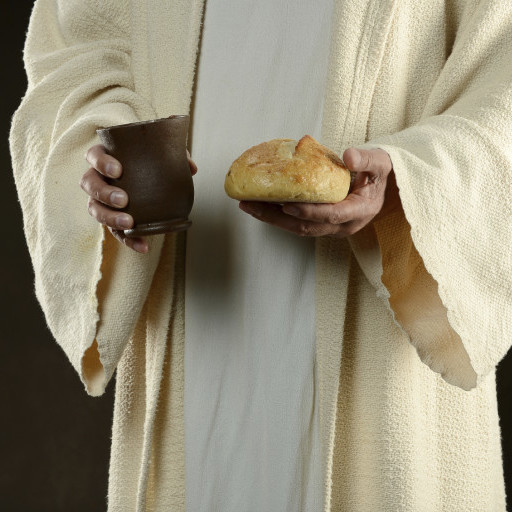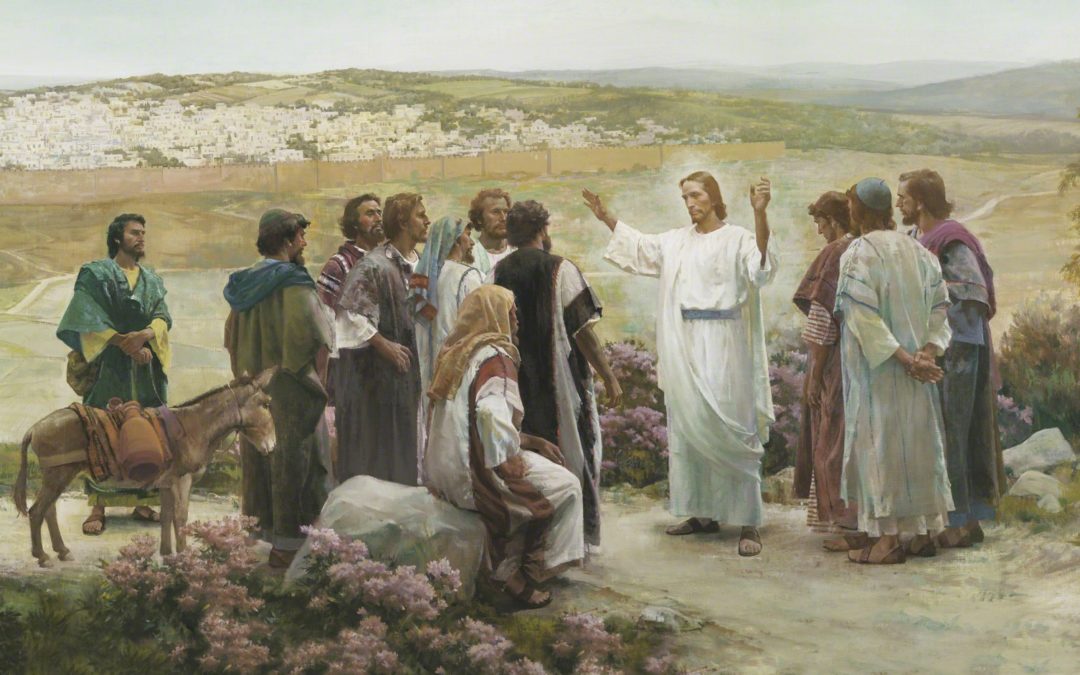The Word “witness” is a keyword in both the prayers for the sacrament of the Lord’s Supper. We tend to think of it as being a witness in a crime scene and court case where we have to testify to what we have seen. But the gospel has an eternal perspective based on the original meanings of the word in ancient Hebrew and Biblical Greek. As with all of God’s ordinances and sacred rituals, there is a covenant involved in the word “witness”. We are not only telling (witnessing to) God we will do certain things, like take upon us the name of Christ, and remember Him and keep His commandments, we are also committing ourselves to go forth, stand up, bear testimony of Christ in our words and behavior and not hide our testimony because of the fear of becoming a martyr and persecuted.
To bear witness is to bear testimony of the truth. Bearing witness truthfully is so important it is one of the ten commandments:
Thou shalt not bear false witness against thy neighbor.[i]
The Midrash is the teachings of the Jews on the meaning of the verses of the Old Testament. Maimonides, a great Jewish teacher who died in 1204 AD, enumerated the 613 Mitzvot or commandments found in the Old Testament. Of the 613 there are 8 that refer to bearing witness.[ii]
Maimonides also wrote that if the false witness caused punishment or harm to the accused, then the bearer of false witness would suffer the same fate when discovered.[iii] So those who bore false witness against Jesus Christ at the trial, were guilty of death.
In the Midrash it is further explained that:
One who bears false witness against one’s neighbor commits as serious a sin as if one had borne false witness against God, saying that God did not create the world.[iv]
Jesus was very aware of the Mitzvot or commandments required of every Jew, especially the one in the Torah that says:
You must not convict anyone of a crime on the testimony of only one witness. The facts of the case must be established by the testimony of two or three witnesses.[v]
When accused by the Pharisees of being the sole witness for the truth of his teachings, implying that he broke a Mitzvot or commandment, Jesus replied:
John 5:31 If I bear witness of myself, my witness is not true.
32 There is another that beareth witness of me; and I know that the witness which he witnesseth of me is true.
33 Ye sent unto John, and he bare witness unto the truth.
34 But I receive not testimony from man: but these things I say, that ye might be saved.
35 He was a burning and a shining light: and ye were willing for a season to rejoice in his light.
36 But I have greater witness than that of John: for the works which the Father hath given me to finish, the same works that I do, bear witness of me, that the Father hath sent me.
37 And the Father himself, which hath sent me, hath borne witness of me. Ye have neither heard his voice at any time, nor seen his shape.[vi]
They were objecting to his testimony that He was the Son of God and wanted to kill him. He went on to say that He only did those things He saw His Father do, that there was a resurrection of the dead and that He had power to quicken and raise up the dead like his Father.[vii]
The apostles were eyewitnesses to the life, miracles, teachings, suffering, death, empty tomb and resurrection of the Lord Jesus Christ. They had to testify to the truth of what they had seen because of a commandment in Leviticus:
If anyone sins because they do not speak up when they hear a public charge to testify regarding something they have seen or learned about, they will be held responsible.[viii]
When choosing a replacement for Judas in the council of Twelve Apostles, the criteria was set forth for the new apostles:
Acts 1:21 Wherefore of these men which have companied with us all the time that the Lord Jesus went in and out among us,
22 Beginning from the baptism of John, unto that same day that he was taken up from us, must one be ordained to be a witness with us of his resurrection.[ix]
Being a witness of Christ involves testifying about His baptism, death and resurrection. The angel that appears to John the revelator as if he were Jesus Christ himself, speaking for Jesus tells John not to worship him because:
I am thy fellow servant, and of thy brethren that have the testimony of Jesus: worship God: for the testimony of Jesus is the spirit of prophecy.[x]
In the Biblical Greek that is the source of our New Testament translations, the word for witness is “martyreo” which is the root of our word for martyr. Truly those who lived and preached Christ in the first generations of Christianity would become martyrs. They felt the keen obligation to bear testimony of Jesus Christ to all the world, even if this ended up with persection, imprisonment, torture and death. “Martyreo” appears 75 times in the New Testament, 44 of those times in the writings of John. The next biggest list is in the Book of Acts.
The Greek “martyreo” means to be a witness, to bear witness and testify that one has seen, heard or experienced the truth of something. Also, it means that the Christian knows it because he or she was “taught by divine revelation or inspiration.”[xi]
Another definition of “martyreo” is to give and not to keep back testimony.[xii] We remember the teaching of Jesus to hold our light (testimony) up for the world to see:
No man, when he hath lighted a candle, covereth it with a vessel, or putteth it under a bed; but setteth it on a candlestick, that they which enter in may see the light.[xiii]
The witness testimony is to be brought out into the view of the world. Like a candle it illuminates all who come in to see the gospel truth. Once the candle witness is on display, then it is imperative to be filled with light as Jesus says:
If thy whole body therefore be full of light, having no part dark, the whole shall be full of light, as when the bright shining of a candle doth give thee light.[xiv]
When we promise, testify and witness in the Sacrament Prayer to be “willing to take upon them the name of thy Son, Jesus Christ”, we are in essence promising to testify to the reality of the Savior’s life, death and resurrection. We live His life, keep his commandments, and our actions become a living testimony that He lives who once was dead.
[i] Exodus 20: 16
[ii] Sefer Hamitzvot by Maimonides
https://en.wikipedia.org/wiki/Thou_shalt_not_bear_false_witness_against_thy_neighbour
[iii] The Commandments Vol. 1 p. 193 as quoted and discussed in Teaching Mitzvot: Concepts, Values, and Activities by Bruce Kadden, 2003, p. 107.
[iv] Mechilta to Exodus 20:13
[v] Deuteronomy 19:15 New Living Translation
[vi] King James Version
[vii] John 5:17-30
[viii] Leviticus 5:1 New International Version
[ix] King James Version
[x] Revelation 19:10 King James Version
[xi] See Blue Letter Bible definition of “martyreo” at:
https://www.blueletterbible.org/lang/Lexicon/Lexicon.cfm?strongs=G3140&t=KJV
[xii] ibid
[xiii] Luke 8:16
[xiv] Luke 11:36

